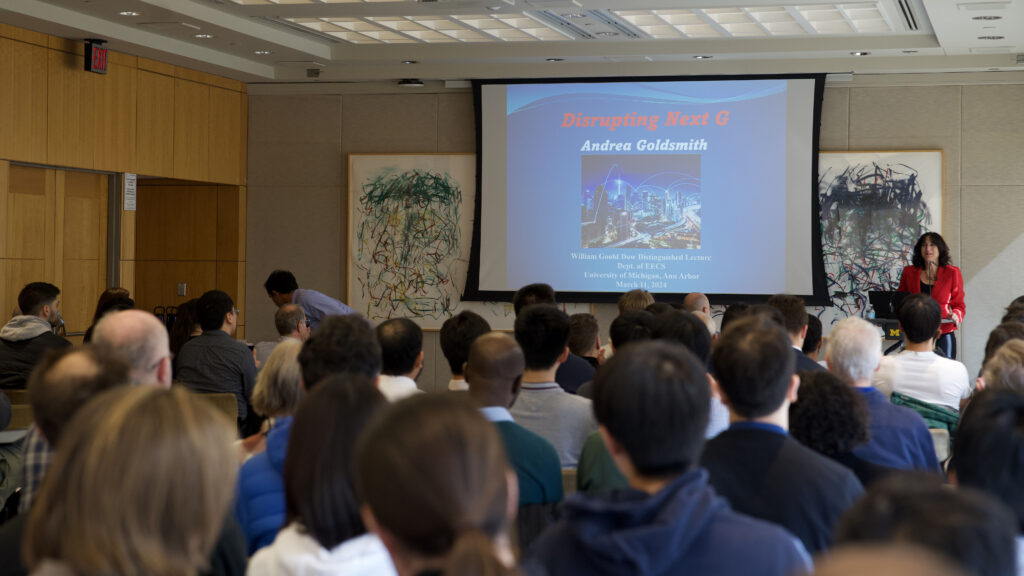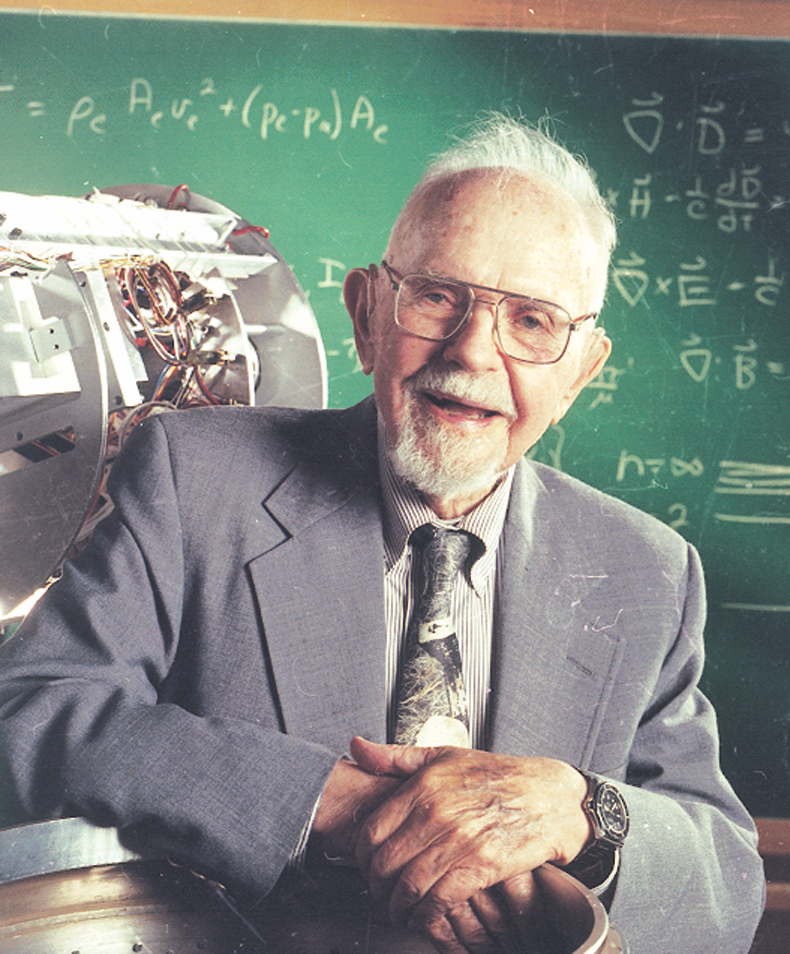Andrea Goldsmith honored with the 21st William Gould Dow Distinguished Lectureship
“I wanted to tell you a little bit about the circuitous career path I took—I never thought I’d be a dean, let alone an engineer,” Andrea Goldsmith told students attending her William Gould Dow Distinguished Lecture. Goldsmith is the Dean of Engineering and Applied Science and Arthur LeGrand Doty Professor of Electrical and Computer Engineering at Princeton University. She is also an entrepreneur and author, and the 21st recipient of the William Gould Dow Distinguished Lectureship, the highest external honor bestowed by the Department.
Goldsmith presented the talk “Disrupting NextG” on March 11, 2024, to a packed room of faculty, students, and staff. The talk was both personal and technical, following her 40-year career in wireless technology—a career that earned her membership in the National Academy of Engineering, the Royal Academy of Engineering, and the American Academy of Arts and Sciences.
Goldsmith was largely raised by her mother, Adrienne Goldsmith, a cartoonist who worked on The Rocky and Bullwinkle Show (and was the model for Natasha Fatale); her father, Werner Goldsmith, was a mechanical engineer at the University of California, Berkeley (UC Berkeley).

She attended UC Berkeley for her undergraduate degree, and then went on to work in Silicon Valley for a defense communications company. There, she discovered her love of wireless communications and specialized problem-solving, which inspired her to pursue graduate school.
Goldsmith ended up back at UC Berkeley. “I was rejected from Stanford [where she would later spend her career as a faculty member, retiring as Harris Professor Emerita] for grad school, by the way—so, if you’re rejected from a school, you may end up teaching there for a long time,” she joked.
Fortunately, her advisor at Berkeley saw her potential. “Taking a chance,” said Goldsmith, “whether it’s on your own research or on hiring someone who may not have all the credentials, if there’s something special about them, can actually pay off.”
During graduate school, Goldsmith spent her summers working at Bell Labs. She loved her work there so much that she considered returning after completing her PhD, but was instead hired at the California Institute of Technology. And four years later, she joined the faculty at Stanford.
During this time, Goldsmith also found her legs as an entrepreneur. She founded Quantenna in 2005, which developed the best WiFi chip in the world at the time. She founded her second company, Plume WiFi, in 2010. The company designed cloud software to manage wireless networks. She recalled that the startup work was “exciting and challenging and terrifying and awful.”
If you found a startup to make money, you are unlikely to be successful because most startups fail. If you start a company to see if your research matters in practice, you will likely be very rewarded.
Andrea Goldsmith
Goldsmith received several awards for this innovative work, including induction into the National Inventors Hall of Fame, the ACM Sigmobile Outstanding Contribution Award, the IEEE Sumner Technical Field Award, and the ComSoc Armstrong Technical Achievement Award. She is the first woman to receive the Marconi Prize, often referred to as the Nobel Prize in Communications. She also received the Silicon Valley/San Jose Business Journal’s Women of Influence Award and was inducted into the Silicon Valley Hall of Fame. She has authored 38 patents.
“If you found a startup to make money, you are unlikely to be successful because most startups fail. If you start a company to see if your research matters in practice, you will likely be very rewarded,” said Goldsmith.
In 2020, during the peak of the COVID-19 pandemic, Goldsmith accepted her current position as Dean of Engineering and Applied Science at Princeton University. She was drawn to Princeton’s informal motto to benefit the nation and all of humanity, as well as the challenge of growing engineering and its impact within a great liberal arts institution.
“It helps to be an optimist, especially when you are taking on leadership roles,” she said.
Goldsmith also advances the field of engineering through her service and advisory roles on the Board of Directors for Intel, Medtronic, Crown Castle Inc, the Marconi Society, and even the President’s Council of Advisors on Science and Technology (PCAST). She recalled the excitement of attending President Biden’s signing of the CHIPS and Science Act in 2022, which authorized a huge investment in semiconductor production and research that enables continued innovation across science and engineering.
As Goldsmith’s leadership and seniority within the field has grown, she has been more intentional about the ways that she promotes diversity, equity, and inclusion in the profession. As an undergraduate, Goldsmith nearly left engineering because she didn’t feel welcomed and accepted as a woman in the field, and she doesn’t find that things have changed nearly enough. She now spends a lot of her time working to make the field more inclusive to women, people of color, and members of other historically marginalized groups. Much of this work took place within the IEEE, including her founding and chairing its Board of Directors Committee on Diversity, Inclusion, and Equity.
“We still have a long way to go in making this profession open and welcoming to diverse people,” she said, “But the profession needs diverse people and their ideas and perspectives to thrive.”
Her work as an inclusive educator and mentor has been recognized with the ACM Athena Lecturer Award and several IEEE honors, including the Education Medal, the Kirchmayer Graduate Teaching Award, and the WICE Mentoring Award. She is author of the book Wireless Communications and co-author of the books MIMO Wireless Communications, Principles of Cognitive Radio, and Machine Learning and Wireless Communications.
Goldsmith’s current work focuses on methods to improve the next generation of wireless technologies and to use them for compelling applications. She envisions the future of wireless technology to be energy efficient, secure, reliable, and fast—capabilities that must be developed to support a host of new applications that will change people’s lives for the better.

About the Lectureship
The William Gould Dow Distinguished Lectureship is the highest external honor bestowed by the Department. William Gould Dow (1895-1999), former faculty member and Chair of the Department, helped establish 13 laboratories and research units within engineering, wrote a classic textbook on electronics, and worked tirelessly to make Michigan the most advanced institution for advanced research in the world.
 MENU
MENU 
